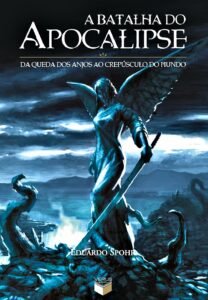“The Battle of the Apocalypse,” authored by Eduardo Spohr, is a Brazilian fantasy novel that narrates the journey of Ablon, a fallen angel who has been exiled from Heaven due to his insubordination towards the archangels. Now endowed with immortality, Ablon traverses the Earth in anticipation of the final confrontation prophesied in the Book of Revelation. As the Apocalypse draws near, Ablon is tasked with confronting formidable celestial entities, including the merciless archangel Michael, while simultaneously unraveling the mysteries surrounding humanity’s destiny. Accompanied by his companion, the sorceress Shamira, he embarks on an expedition through the realms of history and myth, engaging in battles against demons, angels, and divine conspiracies. By interweaving biblical mythology with grandiose action, the novel delves into themes of rebellion, fate, and redemption, all set against the backdrop of a war that will ultimately determine the fate of the universe.

“The Battle of the Apocalypse” by Eduardo Spohr is an epic fantasy novel revolving around Ablon, one of the last surviving renegade angels, as he prepares for a decisive final battle that will determine the fate of the universe. The narrative is set in a world where angels and demons covertly influence human history, manipulating events to fulfill their own celestial agendas. Ablon, a former esteemed general of the heavenly legions, defied the tyrannical archangel Michael and was consequently expelled from paradise along with his allies. Now an immortal warrior roaming the Earth, he awaits the realization of an ancient prophecy signaling the culmination of days.
The novel intricately weaves through various historical epochs, highlighting Ablon’s involvement in significant historical occurrences. Spanning from ancient Babylon to medieval Europe and imperial China, he valiantly combats divine oppression while endeavoring to shield humanity from the machinations of both angels and demons. Accompanying him is Shamira, a formidable necromancer and one of his closest allies, whose magical prowess is vital to their existence. Over the centuries, their relationship deepens, fortifying Ablon’s determination to resist the celestial forces intent on either controlling or annihilating the world.
As the Apocalypse approaches, the archangels, spearheaded by the fervent Michael, prepare to obliterate both fallen angels and humanity during a final purge. Recognizing the precarious balance of creation, Ablon rallies his allies for one last stand. He confronts his former comrades in a monumental battle that unfolds across various realms, extending from Earth to the celestial plane. Hidden truths are unveiled, exposing the true essence of the divine order and the concealed history surrounding the angelic rebellion.
In the climactic confrontation, Ablon challenges Michael’s vision of rigid order and annihilation, advocating not only for the fallen but also for humanity’s right to dictate its own future. The final battle is a remarkable display of divine warfare, wherein angels, demons, and mystical forces collide in an apocalyptic spectacle. Ultimately, the choices made by Ablon will dictate the future of both Heaven and Earth, culminating in a saga of defiance, sacrifice, and redemption that redefines the lines between good and evil.
“The Battle of the Apocalypse” by Eduardo Spohr was originally self-published in 2007 under the NerdBooks label, an initiative associated with the Brazilian podcast Jovem Nerd. The book quickly gained traction among enthusiasts of fantasy and pop culture, which led to its acquisition by the prominent Brazilian publisher Verus Editora in 2010. The official release provided professional editing, enhanced distribution, and a polished edition that broadened its audience. The novel rapidly became a bestseller in Brazil, receiving acclaim for its ambitious world-building, grand narrative, and the innovative integration of biblical mythology with historical and fantasy elements. Critics and readers praised the compelling storytelling; however, some commented on its dense exposition and philosophical dialogues. Despite these criticisms, the success of the book cemented Eduardo Spohr’s status as a prominent figure in Brazilian fantasy literature, inspiring sequels and further exploration of his unique angelic mythology.
Leave a Reply